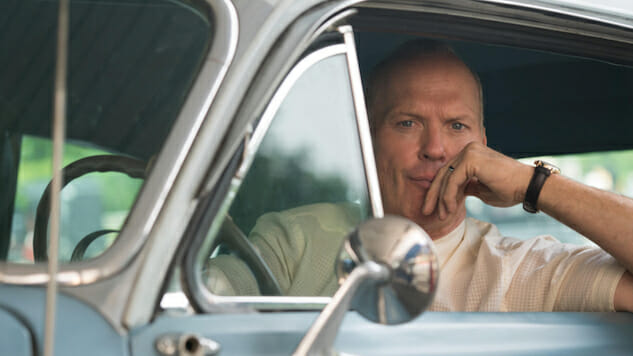Introducing Endless Mode: A New Games & Anime Site from Paste
The story of Ray Kroc—the businessman who shaped McDonald’s into the worldwide fast-food behemoth it is now—is the story of capitalist ambition run amok: that of a man who didn’t so much invent new ways of food production as piggyback off others’ innovations, shape a global franchise and reap the massive profits, shutting out the originators in the process. Kroc’s story might make for a bitter black comedy were it not so relevant to our times, especially now, with what could be seen as Kroc’s political equivalent about to become president of the United States after a campaign that saw him willing to say or do anything just to get elected, just to win.
In short, it’s the kind of material that wouldn’t appear to be in the wheelhouse of John Lee Hancock, the director of the new Kroc biopic The Founder. Certainly, black-comic irony wasn’t much evident in his last picture, Saving Mr. Banks. That film sincerely posited the psychologically restorative effect Walt Disney—a pioneer of marketing childlike innocence to the masses—had on Mary Poppins author P.L. Travers as he attempted to get the prickly author to sign off on his more happy-go-lucky changes in adapting her book to the screen. Sincerity, in fact, is the hallmark of Hancock’s filmography as a whole, which includes earnest dramas like The Rookie, The Alamo and The Blind Side. Such a sensibility would seem all wrong for a movie about an unrepentant capitalist who, among other things, ruthlessly exploited feel-good, can-do American-dream populism for his own personal gain.
That tension between director and material, however, turns out to be a fascinating, if somewhat frustrating, one in The Founder—what makes the film more interesting than perhaps it ought to have been. Hancock seems aware, to some degree, of how temperamentally ill-suited to this material he is, and thus tries to transcend his limitations in subtle ways. Most notable in that regard is Carter Burwell’s score, which is gentle with the exception of a few atonal harmonies that stick out just enough to puncture the reverent aura some of its cues paint. Burwell’s music is indicative of Hancock’s method as a whole: For the most part, he plays the material as a straight great-man biopic, trusting the more subversive overtones of Robert D. Siegel’s screenplay to come out on their own. Contrast that with, say, Steven Soderbergh’s openly satirical approach to Mark Whitacre in The Informant!, in which Soderbergh played the savage ironies of Whitacre’s story—that of corporate wrongdoing being exposed by the whistleblower’s own dishonesty—for all they were worth (especially through that jokey Marvin Hamlisch score). Hancock’s more ambivalent approach can’t help but feel anemic by comparison.
And yet, the fact that The Founder still packs an acidic punch in the end is a tribute to the strength not only of Siegel’s screenplay, but of the cast, especially Michael Keaton as Kroc. An actor generally known more for his live-wire intensity than for romantic magnetism, Keaton does nothing to soften Kroc’s rougher edges, even as he manages to inspire fleeting moments of empathy for Kroc especially in his earlier, more desperate stages as a struggling milkshake-maker salesman. This film’s Kroc is basically a shark from the get-go, but Keaton refuses to turn him into a mere villainous caricature. Instead, he locates the authentic striver in Kroc. If nothing else, he’s a man who fully believes in the value of dreaming big—even if, in this case, dreaming big means amassing enough wealth and power to dominate an entire industry while trampling on all the small businesses underfoot. Just as Keaton’s Kroc plays nice with his targets before baring his fangs, so does The Founder couch itself in good manners before revealing the poison-pen letter underneath.
Director: John Lee Hancock
Writer: Robert D. Siegel
Starring: Michael Keaton, Nick Offerman, John Carroll Lynch, Linda Cardellini, B.J. Novak, Laura Dern
Release Date: Jan. 20, 2017
Kenji Fujishima is a freelance film critic, contributing to Slant Magazine, Brooklyn Magazine, The Playlist, and the Village Voice in addition to Paste. He is also Deputy Editor of Movie Mezzanine and former editor-in-chief of In Review Online. When he’s not watching movies and writing and editing film criticism, he’s trying to absorb as much music, art and literature as possible. He has not infrequently been called a “culture vulture” for that reason.
